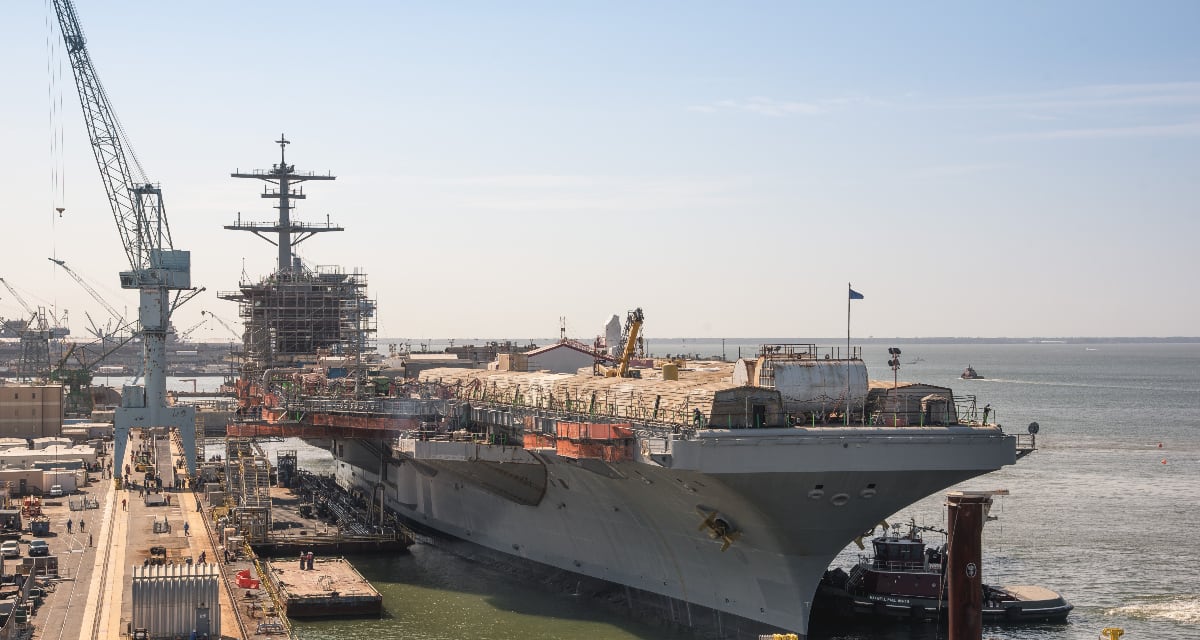House Armed Services Committee Chairman Adam Smith, D-Wash., and Sen. Dick Durbin, D-Ill., ranking member of the Senate Appropriations Subcommittee on Defense, recently wrote in an op-ed on Defense News that Congress “cannot panic and hand out blank checks to defense contractors.” They were concerned with a “lack of detail” in the Pentagon’s stimulus funding request.
Pentagon officials have responded with said requested detail. It’s clear the defense, shipbuilding and aerospace industrial base — an “essential” workforce as designated by the Department of Homeland Security — is indeed in need of help. These critical firms need financial support to the tune of about $11 billion to support more than 100,000 direct jobs. Nor should the military have to take it out of hide, as suggested by some.
According to the Defense Department, the data from industry is showing 30-40 percent inefficiency across the defense industrial base, but certain sectors like shipbuilding are experiencing 50-60 percent inefficiency. At shipyards, for example, blue-collar worker attendance ranges from just half to 70 percent. Other short-term sectors at risk include textile manufacturers, body armor suppliers and small business electronics suppliers, who feed guidance systems and wiring harnesses in Army vehicles and aircraft.
A sampling of specific reasons for inefficiency include:
- Confirmed cases or quarantines
- Government facility closure/standdown test delays
- Telework
- Closures due to travel restrictions
- Logistic implications caused by travel restrictions requiring commercial freight
- Availability of parts and supplies
- High absentee rates
- Local and state lockdowns
- Foreign government lockdowns
- Supplier shutdowns
Pentagon leaders are worried about the near term, but also permanent damage. Officials are “concerned with a potential loss of critical labor skills,” such as welders. Shipbuilders are in dire straits given the “significant touch labor” required to build a ship and “greater facility impact from social distancing.” The potential shutdown of one of the “big seven” private shipyards is a real risk right now.
The Virginia-class attack submarine is currently experiencing delays in its production line, as Newport News Shipbuilding has “prioritized its available workforce on supporting maintenance for in-service submarines and aircraft carriers.” If electricians, engineers and solderers shift from the Virginia assembly line elsewhere, the work is slowed and “the opportunity for the cost to come down on each successive submarine hull is diminished.” Congress has repeatedly supported this program above recent budget requests and presumably cares greatly about this unanticipated cost overrun through no fault of nor negligence by the contractor.
The Air Force is experiencing major program delays due to the impact on the aerospace industrial base — both primes and suppliers. Programs impacted include the F-35 Joint Strike Fighter and KC-46 tanker due to facility shutdowns in the U.S., England, Italy and Japan. These two aircraft programs will likely miss major milestones — therefore delaying the time when they become available to the war fighter.
Aircraft engine-maker GE Aviation is a “fragility concern” across the armed forces. For the Air Force, the Joint Air-to-Surface Standoff Missile and the Advanced Medium-Range Air-to-Air Missile are “being impacted by reduced workforce and facility availability.” The Small Diameter Bomb motor supplier is being pulled to support the Federal Emergency Management Agency with motors for hospital beds. Aerospace firms with commercial work are reporting problems given the massive decline in commercial demand, which affects defense.
Contrary to the assertion that the Pentagon doesn’t need more stimulus money to support contractors, the services are “concerned about large commercial companies, like Boeing and GE that are critical to our defense industrial base facing negative cash flow and other associated impacts from COVID-19.”
RELATED

Small businesses and subcontractors are particularly vulnerable as they have far less slack to respond to crises. Many live contract to contract, as indicated by a 2018 Pentagon report. According to the Defense Department, “small businesses … have been the hit the hardest due to unfamiliarity that [the] defense industrial base is exempt from most local shelter-in-place orders.”
The Pentagon’s request for more stimulus money is not a case of pork for primes. This industry has “a notably high rate of subcontracted work flow and systems with high component volumes, driving job loss directly to program partners and the supply chain.” So while virtually all of the Pentagon’s missiles are built by two primes, 98 percent of the subcontractors making parts for U.S. munitions are the only source for these items. If these unique businesses fail, there may not be any replacements.
A study last year by George Mason University found “contractor workforce challenges have a direct impact on the government’s ability to ramp up quickly.” Budget fluctuations are particularly hard on small companies that “do not have large enough portfolios to shift people between projects. The contractor workforce loses skills or move on.” These firms operate with “thin margins and low lines of credit.”
The additional costs to respond to COVID-19 were not part of the original contracts the companies are currently performing, and warrant stimulus money. Hopefully, Chairman Smith and Sen. Durbin now agree.
Mackenzie Eaglen is a resident fellow at the American Enterprise Institute.








